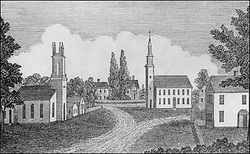BELLAMY, JOSEPH

(20 February 1719, Cheshire, CT-6 March 1790, Bethlehem, CT). Education: B.A., Yale College, 1735; studied theology with Jonathan Edwards*, 1735-37. Career: Minister, Bethlehem, CT, 1738-90.
Joseph Bellamy has been called "the most undeviating of Jonathan Edwards's disciples," which suggests both Bellamy's debt to Edwards and the difficulty of maintaining the ideas of Calvin and Edwards in the Age of Enlightenment. Bellamy did "deviate," and his innovations are as significant as his underlying loyalty to Calvinism.
One of the brightest young men of his age, Bellamy graduated from Yale at age sixteen, studied under Edwards in Northampton for two years, and was licensed to preach when he was eighteen. He was much in demand as an itinerant preacher during the early years of the Awakening and traveled throughout New "England. But he spent most of his half century in the ministry in his small parish of Bethlehem. There he was surrounded by many students, including some fifty who became ministers, and a number of lay men and women, including Edwards's later-to-be notorious grandson, Aaron Burr.
In some respects a conservative, Bellamy insisted on the importance of grace for redemption and demanded that full church membership be limited to the visible saints. He called the Half Way Covenant, “an external graceless covenant." But despite such signs of loyalty to tradition, Bellamy is known for several influential innovations in Congregational thought. In particular, he emphasized God's "moral government." Bellamy said that God, the universal lawgiver, had established a system of rules to guide and ennoble humanity. He did not create sin, but permitted it-the actual sin was in the doing of wrong, and the fault vas humanity's. God might have created a universe without sin, but that would lave been a world without glory. The universe, Bellamy argued, was "more holy and happy than if sin and misery had never entered" Similarly, the meaning of Christ's life was not in his sacrificial atonement to an angry God, but in his embodiment of God's love.
Although Bellamy justified "the wisdom of God in the permission of sin" in several respects he softened the rigor of traditional Calvinism. His New Divinity included the possibility of universal redemption. Sin, according to Bellamy, was not a well-neigh insurmountable debt occasioned by Adam's fall, but a series of daily failures, subject to reform. In such ways Bellamy can be reedited with keeping alive basic Calvinist categories, such as sin and grace, while explaining them in a way that appealed to a world that was increasingly inclined to think well of humankind.
Bibliography
A: True Religion Delineated (Boston, 1750); Four Sermons (Boston, 1758); A Dialogue on the Christian Sacraments (Boston, 1762); The Wisdom of God in the Permission of Sin, Vindicated (Boston, 1769); A Careful and Strict Examination of the External Covenant (New Haven, 1770); Works, 2 vols. (Boston, 1850).
B: AAP 1,404-12; DAB 2, 165; DARB, 42-43; NCAB 7,78; RHAP, 406-7; SH 2, 33-34.
Joseph Bellamy has been called "the most undeviating of Jonathan Edwards's disciples," which suggests both Bellamy's debt to Edwards and the difficulty of maintaining the ideas of Calvin and Edwards in the Age of Enlightenment. Bellamy did "deviate," and his innovations are as significant as his underlying loyalty to Calvinism.
One of the brightest young men of his age, Bellamy graduated from Yale at age sixteen, studied under Edwards in Northampton for two years, and was licensed to preach when he was eighteen. He was much in demand as an itinerant preacher during the early years of the Awakening and traveled throughout New "England. But he spent most of his half century in the ministry in his small parish of Bethlehem. There he was surrounded by many students, including some fifty who became ministers, and a number of lay men and women, including Edwards's later-to-be notorious grandson, Aaron Burr.
In some respects a conservative, Bellamy insisted on the importance of grace for redemption and demanded that full church membership be limited to the visible saints. He called the Half Way Covenant, “an external graceless covenant." But despite such signs of loyalty to tradition, Bellamy is known for several influential innovations in Congregational thought. In particular, he emphasized God's "moral government." Bellamy said that God, the universal lawgiver, had established a system of rules to guide and ennoble humanity. He did not create sin, but permitted it-the actual sin was in the doing of wrong, and the fault vas humanity's. God might have created a universe without sin, but that would lave been a world without glory. The universe, Bellamy argued, was "more holy and happy than if sin and misery had never entered" Similarly, the meaning of Christ's life was not in his sacrificial atonement to an angry God, but in his embodiment of God's love.
Although Bellamy justified "the wisdom of God in the permission of sin" in several respects he softened the rigor of traditional Calvinism. His New Divinity included the possibility of universal redemption. Sin, according to Bellamy, was not a well-neigh insurmountable debt occasioned by Adam's fall, but a series of daily failures, subject to reform. In such ways Bellamy can be reedited with keeping alive basic Calvinist categories, such as sin and grace, while explaining them in a way that appealed to a world that was increasingly inclined to think well of humankind.
Bibliography
A: True Religion Delineated (Boston, 1750); Four Sermons (Boston, 1758); A Dialogue on the Christian Sacraments (Boston, 1762); The Wisdom of God in the Permission of Sin, Vindicated (Boston, 1769); A Careful and Strict Examination of the External Covenant (New Haven, 1770); Works, 2 vols. (Boston, 1850).
B: AAP 1,404-12; DAB 2, 165; DARB, 42-43; NCAB 7,78; RHAP, 406-7; SH 2, 33-34.
